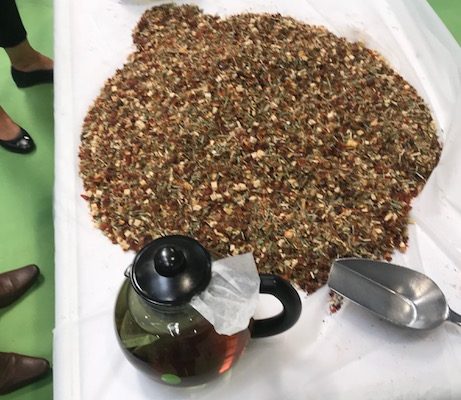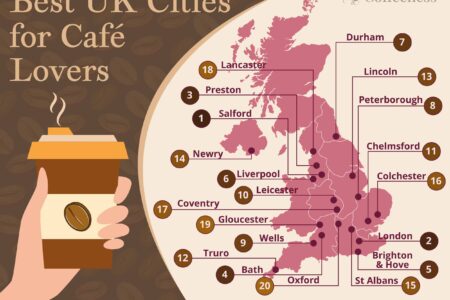Specialty Tea & Coffee Reign at Tea & Coffee World Cup 2018

Tea remains the preferred cup in the United Kingdom – at least that was evident at this year’s Tea & Coffee World Cup, which was held in Birmingham, England, 3-5 September – but the interest in and growth of specialty coffee is strong.
Tea consumption is thriving in the UK. According to the 2018 Tetley Tea Report, one in five consumers are drinking more tea than they did a year ago. Furthermore, 34% of tea drinkers are willing to pay extra for more premium brands. Evidencing the interest in more premium tea, the report found that 29% drink more loose-leaf tea out of home than this time last year.
Pursuant to the intense interest in specialty tea and herbal/fruit teas, Tea & Coffee World Cup offered a wide array tea presentations and workshops headed by Jane Pettigrew of the UK Tea Academy. The UK Tea Academy’s classes included: The Basics of Brewing & Comparative Tasting, Cupping & How to Taste Tea, Tea & Cheese Pairing and Tea & Chocolate Pairing. Other tea sessions included Flavour, Fruit & Herbal Creations presented by Sinas GmbH & Co KG (see Blending Tea at Tea & Coffee World Cup, which posted on our website on 4 September), Introduction to Japanese Tea presented by Wollenhaupt GmbH and Matcha, From Traditional to Modern presented by J-Port Green Tea.
In the conference area, Jane Pettigrew presented twice: Why Your Customers Deserve More – Why Good Tea Matters, in which she offered attendees examples of poorly brewed tea and properly brewed tea; and World Tea Trends in which she covered everything from black and green tea to matcha, kombucha and cold brew tea, while highlighting specialty tea and explaining the difference between actual tea and herbals and fruit infusions. “The term tea is used universally to mean pretty much anything that is dunked in hot – or cold water – and drunk as a beverage…since researchers and pollsters tend to include herbals and fruit infusions in their figures, but what we at UK Tea Academy are interested in is TEA – made from the tea plant – camellia sinensis,” said Pettigrew, noting that while some may think an ‘umbrella’ term is fine, there is a difference between tea, herbals and fruits and “it does matter as the ingredients of tea leaves are different and the health benefits of tea are different from all other infusions.”
Nigel Melican, the president of the new European Tea Society, during his presentation, explained the need for a new tea association focused on “creating and inspiring excellence in the specialty tea community through innovation, research, education and communication.”
Those attendees interested in specialty coffee had myriad presentations and classes from which to choose. Emma Haines of the London School of Coffee (and a Specialty Coffee Association trainer) offered several classes including: Introduction to Cupping, Brewing Part I and Brewing Part II. Sean Elder of James Aimer Ltd and an SCA trainer, held three classes during TCWC: Advanced Cupping, Sensory and Cupping for Defects and To Blend or Not to Blend. For those interested in the “backend” side, Edward Anderson Brown, of Ally Coffee, who placed third at the 2018 UK Roasting Championships, taught The Effects of Roasting Degree, which examined how different roasting approaches affect the final cup of the coffee.
Cup of Excellence
In a special session, the Alliance for Coffee Excellence cupped the top 10 Cup of Excellence winners from the recent Burundi competition, as well as a selection of COE winners from the recent Rwanda competition. After cupping the Burundi coffees, one attendee exclaimed, “I’ve never before had the opportunity to taste the top 10 coffee from any COE competition. These are amazing.” The Burundi and Rwanda coffees will be going up for auction in just a few weeks.
In his presentation, A Farm to Cup Story, Howard Barwick, European business development manager at Olam Specialty Coffee pointed out that specialty coffee is “more than one single definition, action or circumstance,” noting that “location has influence,” before detailing 15 segments that bring coffee from “the farm to the cup.”
Paul Stack, president of the SCA and operations director at Marco Beverage Systems, spoke about the opportunities for coffee and tea companies to innovate – and the need to do so in this age of technology and connectivity, and where millennials dominate. For coffee and tea companies to find success or even remain relevant in today’s climate, Stack said, “It’s about sustainability, provenance, quality, production, service and atmosphere.”
Other featured presentations were from companies such as INTL FCStone, Euromonitor International, Probat-Werke, the Alliance for Coffee Excellence, Union Papertech Ltd, as well as David Veal, the former brand ambassador of the SCA, whose presentation, The UK Market: A Journey Through Time, chronicled coffee’s history in the UK, and former SCA president, Mick Wheeler, who spoke about Papua New Guinea’s new coffee grading standards.
Exhibitors such as Alstrom-Munksjö, Dethlefsen & Balk GmbH, GEA Process Engineering, Gladfelter GmbH, Haelssen & Lyon GmbH, IMA/Petroncini, Mount Everest Tea, NDC Technologies, Neuhau Neotec, Oxalis, Purico Filtration Paper, Royal Greens, Ruben Gandia Threads, Swiss Pack Europe, Tsubakimoto Kogyo Co Ltd, and Zwirnerei AD Wutach Gmbh, all showcased their latest products, equipment and technologies.
Next year’s Tea & Coffee World Cup will return to Asia so stay tuned for the announcement of the location and dates.



